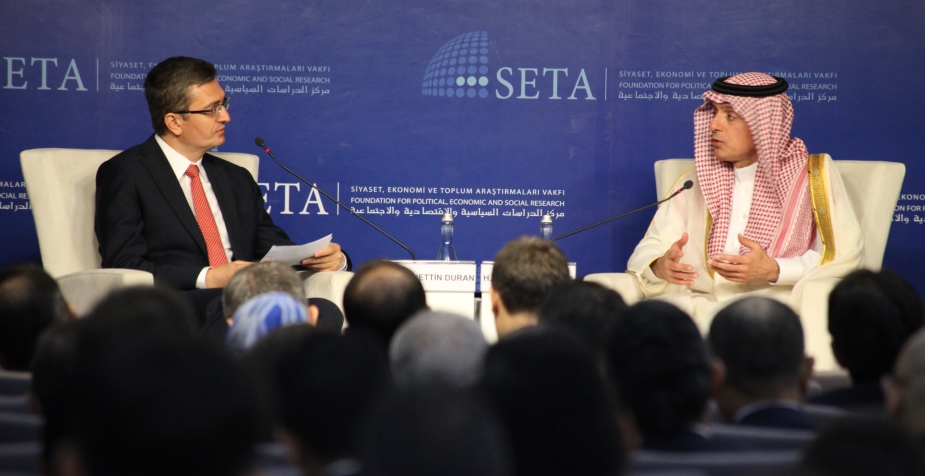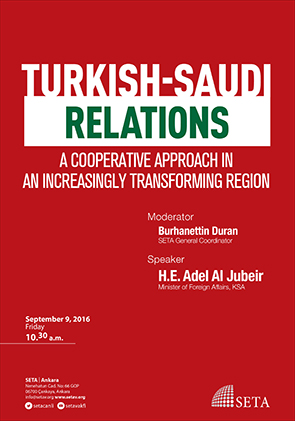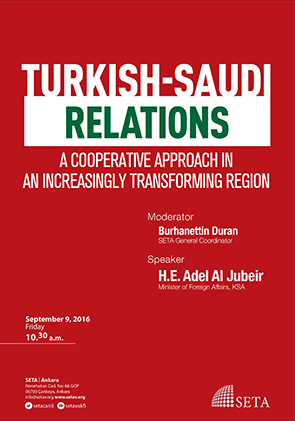Event
Turkish-Saudi Relations: A Cooperative Approach in an Increasingly Transforming Region
- End :
- Address :


Turkish-Saudi Relations: A Cooperative Approach in an Increasingly Transforming Region
LECTURE | SEPTEMBER 09, 2016
DATE: SEPTEMBER 09, 2016 TIME: 10:30 VENUE: SETA ANKARA
RSVP: fp@setav.org | Bünyamin Keskin | 0312 551 21 22
| Moderator |
|
| Speaker |
|
On September 9th, 2016, SETA hosted a talk by H.E. Adel Al-Jubeir, Minister of Foreign Affairs for the Kingdom of Saudi Arabia, entitled “Saudi-Turkish relations: a cooperative approach in an increasingly transforming region.” The talk was followed by a question and answer segment lead by SETA General Coordinator Burhanettin Duran.
H.E. Al-Jubeir’s talk began by describing the history of the Kingdom of Saudi Arabia’s establishment, and outlining its strategic position in the region of the Middle East. He emphasized the religious responsibility the Kingdom bears in terms of the 1.6 billion Muslims that face towards it in prayer every day, as well as its geoeconomic responsibility with it possessing up to 25% of the word’s oil reserves, reaffirming that the Kingdom, subsequently, approaches foreign policy from a position of practicality and an awareness of that responsibility. H.E. Al-Jubeir stressed the need to look internally to improve the quality of life for people in the Kingdom, pointing to initiatives that seek to diversify the economy away from oil, focusing on innovation and youth stimulus, as well as establishing complex, multifaceted partnerships with allies in the region, Turkey being at the spearhead of that list. He expressed the similarity in the Kingdom and Turkey’s approaches in terms of opposing sectarianism, a focus on internal development, and concentration on increasing prosperity. This has provided the basis and willingness for a strategic relationship, and, the Foreign Minister expressed, serves as a foundation that will elevate the two countries’ relationship in the future.
The Foreign Minister drew attention to the many regional issues that are at the forefront of the Kingdom’s concern, such as the political situations in Yemen, Libya, Syria, Iraq, and Iran, as well as religious extremism, terrorism, and sectarianism. He stressed that resolving these issues requires an approach that blends firmness and wisdom, and strong cooperation between like-minded countries. He pointed to the history of Turkish-Saudi relations, going back to their mutual anti-communist approach, and their common opposition towards the Soviet Union at a time where others in the region would not define their stance. Today, the Foreign Minister expressed, the two nations’ most important cooperation exists in the realms of security, military, economy, culture, and religion, and it is now the time in which that relationship will deepen through institutionalizing their alignment, such as has already begun by the establishment of the Saudi-Turkish Coordination Council at the 13th Organization of Islamic Cooperation Summit.
The Foreign Minister expressed his concern for the situation in Syria, denouncing Bashar Al-Assad’s culpability in the deaths of 600,000 and the displacement of a further 12 million Syrian people. He underscored that Assad has no place in the future of Syria and is becoming increasingly isolated in the region, a position held by both Turkey and Saudi Arabia. The most fitting approach, he argued, is the support for moderate rebels and the establishment of a road map for peace as outlined by UN Resolution 2254, leading to an increase in international pressure for Assad to accept the transition.
On terrorism, Mr. Al-Jubeir condemned sectarianism in Iraq, citing it as a catalyst for the growth of extremist ideology and the infiltration of Daesh in the region. He expressed that an unstable Syria means an unstable Iraq, and the removal of Assad is the first step in the solution to both. He also referenced the deteriorating situation in Libya, describing it as “on the verge of being a failed state”. He stated the necessity of intervention in order to stop Daesh from expanding into Libya, explaining that a vacuum of power in the country would doubtlessly leave room for terrorist groups. He outlined the Kingdom’s approach to dealing with terrorism in terms of dealing with what he called “the men, the money, and the mindset”, which entails identifying and prosecuting individuals; limiting the flow of money through restrictions on charities and the tightening of financial regulations; as well as a government effort to counter extremist ideology through media campaigns, counseling programs, and rehabilitation initiatives.
On Iran, the Foreign Minister expressed great concern over what he argued was evidence of the Iranian government harboring terrorists, smuggling explosives into neighboring countries, as well as attempts to infiltrate other countries in the Middle East with spy cells, also citing past occasions where Iran has been culpable in the assassination of diplomats and attacks on embassies. He emphasized the necessity of Iran to change its approach to foreign policy, and that in order for it to prove itself as a nation state, it must respect international law and the autonomy of its neighbors, stating that Saudi Arabia and Iran would mutually benefit from improved relations and trade should the latter change its approach.
In regards to Yemen, Mr Al-Jubeir stressed that the Kingdom of Saudi Arabia did not seek to be involved in a war, rather, that it was at the request of assistance by the legitimate Yemeni government that the Kingdom intervened. He stated that the Kingdom desires for a resolution through a political process, but has been forced to act militarily due to the Houthis’ use of violent force. He stated that the concern now is drafting a new constitution that is based on a national dialogue and the will of the Yemeni people.
Upon receiving questions from SETA General Coordinator Burhanettin Duran, the Foreign Minister expressed that “the [Turkish] people deserve a lot of respect” in reference to the people’s firm stand against the illegal coup attempt of July 2016, stating that he was stunned by the endeavor of a small group to impose its will on and subvert that of the majority of the Turkish people. He described his inspiration by the ability of the opposition parties to come together to condemn the coup attempt and continue their parliamentary work despite the threat.
?????? ???? ???????? ???? ???
